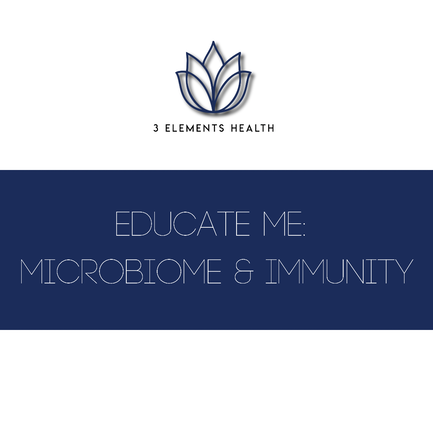|
3/6/2021 0 Comments The Microbiome and ImmunityI am sure many of you have heard that gut health is important for robust immunity - but HOW? The microbiome refers to the organisms that reside in and on our body’s, they are non-human, but our life would not exist without them, and likewise we are essential for their survival - this is called a symbiotic relationship; we provide a home for them and food supply, and in return they do amazing things for our health, most importantly our immune system. FACT - our immune system behaves dependant on our first 1,000 days of life from conception. Yes we can improve (or worsen!) our immunity with dietary and lifestyle habits throughout our entire life, but what it reacts to, how it reacts, and diseases we have a predisposition to occurs due to that first 1,000 days! The most important factor being how we SEED and then FEED the microbiome.... The process in which we were born, and the way in which we were fed as a newborn and then for the remaining part of the 1,000 days following that, and these two factors are what sets our microbiome.
What the microbiome does is TRAINS our immune system how to operate, it tells our immune cells what is friend, and what is foe and how we should react to certain triggers. So, without the right microbes in place our immune system can react to any signal as being harmful, as there are no microbes to regulate this. We are more likely to develop asthma, eczema, hayfever, food allergies, any “allergic type” disease and specific genetic diseases later in life. So how do we SEED the microbiome, and how do we FEED the microbiome - it starts at birth. When we are born vaginally, we are exposed to a huge dose of Mummas bacteria through the birth canal, it enters our ears, nose and mouth and becomes the initial “seeding” of the bacteria which will eventually grow in our gut and elsewhere, which then trains and regulates our immune system, then as we nuzzle and feed from Mummas breast, and consume the milk, we are then exposed to further bacteria, the right nutrient balance to feed our seeded microbes and a high amount of an antibody called IgA which plays a crucial role in immunity and the health of our mucous membranes. Now there is the other side of this, being born via C-section completely misses this initial seeding process, and the first bacteria we are exposed to are the surgeons gloves, and whatever else is in the operating theatre. Then if fed via formula instead of breastmilk, we are gaining nutrition for survival, but missing the further bacteria and the IgA for immune development and the incorrect balance of nutrients for the microbes. I must mention here - that C-section births are sometimes essential and lifesaving at times, and if a mother cannot breastfeed then naturally formula is going to be the essential option - this information is not to invoke any guilt about your journey, but to educate you that yes there is a difference, and there are things we can do to improve our health outlook. It is important to know that with the latter situation we have skipped the natural SEED and FEED process and the microbiome does not develop in the same way, and therefore nor does the immune system. But, there are ways we can do to minimise the impact, and turn the journey around to reinstate a healthy microbiome - especially in the first 1,000 days.
If your child is well past their first 1,000 days (or your own for that matter), and neither of these things were utilised, it doesn’t mean that health is “doomed”, but what it does mean is that your child's or your own immunity may be more sensitive, and the need to focus on things you can control - nutrition, household toxins, stress and general healthy living become SO important moving forward, and if allergic or other health issues do exist - then special attention to gut health is essential. Never under estimate the power of small, and very achievable daily health habits and the impact they are making for lifelong health!
0 Comments
Leave a Reply. |
By April ButtApril Butt is a passionate Health Practitioner and Nutritionist. Her approach to health, as well as food, is practical and sustainable. Within this blog she shares pearls of wisdom to make living a healthy lifestyle achievable for everyone. Archives |
Proudly powered by Weebly


 RSS Feed
RSS Feed